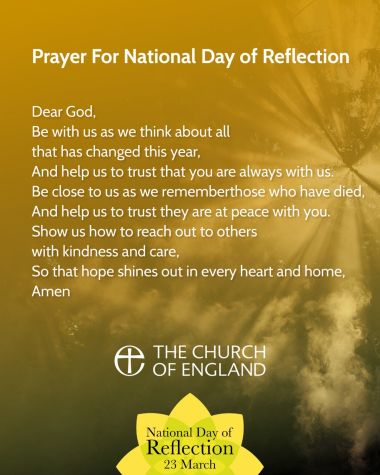Why I can't stop worrying about this Church of England prayer

Oh dear. I'm about to be criticised for being a curmudgeonly fault-finder who has nothing better to do than nit-pick over words.
As it happens, I do have many better things to do – but on this occasion (miraculously) I seem to be a little ahead of schedule. And, also, sometimes there are things you feel you really have to write about.
So let us ask ourselves this question: when the Church of England produces a prayer for a National Day of Reflection (as was held in the UK this week), what could possibly be wrong with it?
Well, here is the prayer, or at least one of two very similar versions of it: God of Love, As we think about all that has changed this year, help us to trust that you are always with us. As we remember those who have died, help us to trust they are at peace with you. As we reach out to others with kindness and care, may hope shine out in every heart and home. Amen.
Pretty mild and inoffensive, right? I mean, which person with any kind of faith could not say that? So couldn't we all quite happily join in with it? Well, alas not... Here's why: What this prayer contains is a startling but casual assumption that all those who have died during the pandemic (and presumably from other causes as well) over the past 12 months are 'at peace with' God. And the prayer wants us to ask God to help us believe that to be true.
There are only three problems with this. The first problem is, simply, that it is not true, and therefore it is not something we should be asking God for. The second problem is that it is not what the Church of England teaches. And the third issue is that it is not what the Bible teaches.
That first difficulty, of course, stems from the second one, and that second one in turn arises directly from the third one. So let us see what Scripture actually says, and what Christians in all denominations have mostly believed for the last 2,000 years.
The New Testament letter to the Hebrews tells us: 'People are destined to die once, and after that to face judgment,' (Hebrews 9v27). So the clear implication here is that it will not be alright for everyone – because there is a judgment – unless God decides to let everyone (Hitler, Pol Pot, Mao, Stalin – and also us, of course) off the hook.
But God doesn't decide to let everyone off the hook. Jesus is quite explicit. Here he is in Matthew 7: 'Not everyone who says to me, "Lord, Lord," will enter the kingdom of heaven, but only the one who does the will of my Father who is in heaven. Many will say to me on that day, "Lord, Lord, did we not prophesy in your name and in your name drive out demons and in your name perform many miracles?" Then I will tell them plainly, "I never knew you. Away from me, you evildoers!"'
The criteria here is whether we know Christ.
And in case we are still in any doubt, here is Jesus in Matthew 25 saying that on the day of judgement God will say to those on His left, 'Depart from Me, you who are cursed, into the eternal fire prepared for the devil and his angels. For I was hungry and you gave Me nothing to eat, I was thirsty and you gave Me nothing to drink, I was a stranger and you did not take Me in, I was naked and you did not clothe Me, I was sick and in prison and you did not visit Me.'
Jesus says they will reply: 'Lord, when did we see You hungry or thirsty or a stranger or naked or sick or in prison, and did not minister to You?' And God will answer: 'Truly I tell you, whatever you did not do for one of the least of these, you did not do for Me.' Jesus then adds: 'And they will go away into eternal punishment, but the righteous into eternal life.'
Here, Jesus makes it clear that whether we know Christ is authenticated by love for our fellow believers. The least of 'these' almost certainly refers here to other Christians – look it up in the online ESV Study Bible if you're in doubt!
So it is not the case that everyone will be 'at peace with' God as our Anglican prayer exhorts us to believe. And this is not what the Church of England believes, either. The 39 Articles of Religion speak of 'the severity of God's judgement' (Article 12), and how in our natural state all of us as humans are 'very far gone from original righteousness' (Article 9). What is the answer? 'There is no condemnation for them that believe and are baptized,' (Article 9 again).
What's so disappointing about this prayer is that it seems to have been written by someone without even basic theological knowledge. And how it could then get approved for circulation more widely is deeply worrying.
Of course, God's mercy and justice are beyond our finite comprehension. He is far more merciful than most of us tend to be for much of the time. But recognising that wonderful truth should not mean we can offer people false hope, in false prayers, based upon false teaching.
David Baker is a Church of England minister, Contributing Editor at Christian Today, and Senior Editor of Evangelicals Now.











